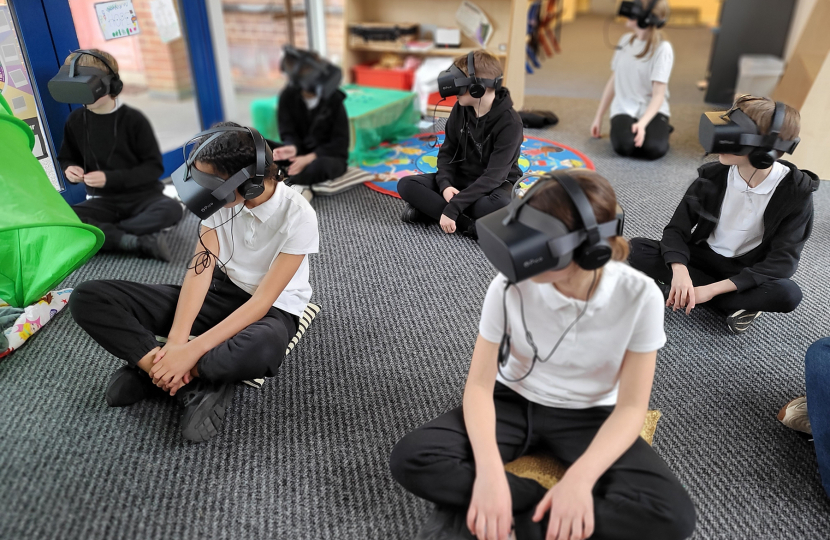
A new interactive educational project that uses Virtual Reality technology to help children navigate online dangers is set to be rolled out across Leicester, Leicestershire and Rutland.
As the nation prepares to mark Safer Internet Day (Tuesday 11th February), Police and Crime Commissioner Rupert Matthews has confirmed the First Phone: Keeping Children Safe Online programme will be available to schools free of charge across the city and two counties throughout 2025 following a successful pilot.
The PCC-funded initiative, which has cost £40,600 to produce, has been developed in conjunction with the Violence Reduction Network (VRN) and other key partners and aims to reduce the vulnerability of children aged nine to 13 to serious violence online through innovative, high-tech engagement.
It consists of a new six-minute film to be viewed in 360 Virtual Reality (VR) and an accompanying six session educational programme that follows the PSHE curriculum to be delivered by teachers or youth leaders in a range of school and youth settings.
The film is also available in a variety of accessible formats including 2D, subtitles and audio-description to ensure everyone can engage in the learning.
Through the film, pupils are empowered to open up to parents, caregivers and teachers about issues they might face online and identify trusted sources of support. They will also be educated on the relationship between virtual and physical spaces and how easily issues can escalate.
The supporting PSHE toolkit aims to unpick key themes of the film and look more closely at the risks and benefits of social media, drawing on issues such as cyber-bullying, ‘anonymous users', and the impact of algorithms.
It also promotes parental and caregiver involvement, sharing useful resources that encourage conversations to continue at home.
Following a successful pilot in February last year involving 500 primary-aged children and selected secondary settings, the project is set to roll out across Leicester, Leicestershire and Rutland.
Members of the PCC's team are delivering training throughout January and February to up to 120 teachers on how to use the VR equipment and deliver sessions across their trusts. These teachers will then ‘train the trainer' in their own organisations to expand the reach of the project.
Mr Matthews said: "I am really excited by this project. Delivering safety messages to young people can be extremely challenging. This is why it is so important to communicate in a language they understand and in a medium that will hold their interest.
"The use of VR as an educational tool is really growing and I am delighted to have funded its application locally. The pilot was exceptionally well received, and I am confident the roll out of this initiative further will help to keep more young people safe.
"We live in a highly technical world. The pace of advance can be frightening for parents and caregivers, but it's imperative we stay ahead of the game and fully understand the risks. Then we can give our children the support they need to protect themselves from harm."
The project has been trauma-informed and promotes a ‘bystander approach'. This means empowering young people to take action to protect themselves and their peers from harm.
Producers drew on feedback from school children themselves, parents, teachers, police officers, trauma-informed specialists, educational representatives and a behavioural change expert when designing the film and its resources.
Although the VR equipment is now booked out for the remainder of the academic year 2024/25, the toolkit remains available for everyone in a 2D format. Many institutions have expressed their intention to run the programme annually.

